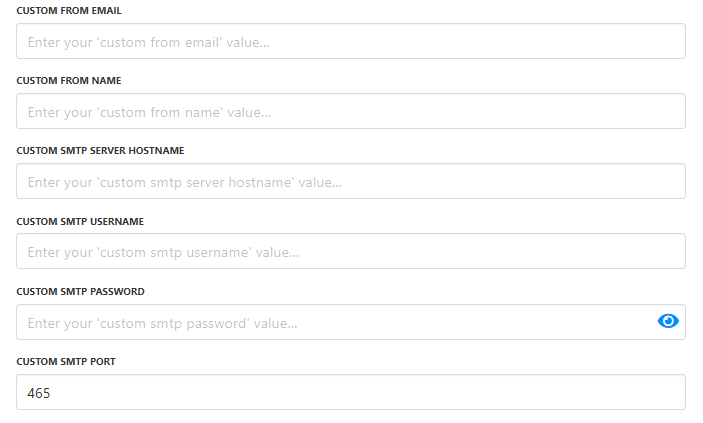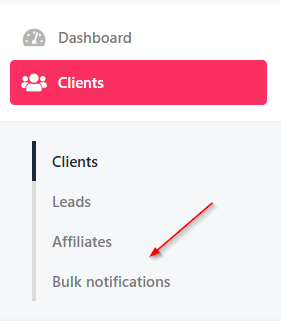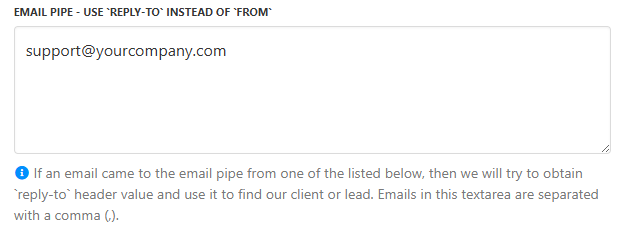How does Email work in Upmind
Configure outgoing and incoming email
Upmind provides integrated email management for handling both outgoing communications and incoming support requests. This guide covers how to:
- Set up default and custom outbound email
- Connect your own external SMTP mailbox
- Send bulk email through Upmind
- Configure incoming email piping
You can learn how to format your email templates in text, HTML, and snippets of Twig code from this guide.
Outgoing email
This section covers all transactional, bulk, and manual emails sent from Upmind to customers, leads, and staff.
Default email configuration
Once registered, you can create a default support department email (e.g., [email protected]). This can be accessed from Settings > Support Departments under Branding and Customisation.

Settings > Branding and customisation > Support departments
Upmind utilizes Amazon SES to send all transactional, event-based, and manual emails, including invoices, password resets, and ticket notifications, ensuring excellent deliverability.
New accounts have sending limits to protect sender reputation, which gradually increase as activity grows. You can also create additional support department emails, such as [email protected], if needed.
Adding a custom SMTP server
Upmind can send emails through your own SMTP-enabled mail server, including third-party providers like Mailgun, MailChannels, or SpamXperts.
To configure your custom mailserver:
- Navigate to Settings > Notification Channels under Automation.

Settings > Automation > Notification channels
- Under
Email Channel, select Use Custom SMTP.

Custom SMTP
- You must specify a From Email and From Name. While these don’t require authentication and can be any name or email, it’s best to use the email linked to your SMTP server.
- Fill in the information as needed, which can usually be obtained from your email provider (e.g., cPanel, Microsoft 365):
- SMTP Server Hostname
- Username
- Password
- Port

Add details
- Save the changes.
- If you want to send a test email to a client, you can do it manually by choosing the client first.
- Then go to Overview > Quick Actions and click on Send Email.

Clients > Overview > Quick actions
By impersonating a client, you can also test it from the client’s profile by clicking on Open New Ticket under Support.

Open new ticket
Sending bulk email through Upmind
Announcements and newsletters can be sent through Upmind under Client > Bulk Notifications. This feature is meant for quick client updates, not as a full replacement for tools like Mailchimp or CampaignMonitor.

Bulk notifications
Newsletters will be sent through either Upmind’s Amazon SES or your custom SMTP server. If using a custom SMTP, remove mailing limits for high-volume sends.
For more information on how to send bulk emails to clients, follow this guide.
Incoming Email
This section covers emails from customers and leads to Upmind, including new sales or support inquiries and replies to support tickets.
Incoming email piping
Clients can reply to Upmind-generated emails using the default outbound SMTP configuration or send new messages to any address at your Upmind dashboard domain (e.g., [email protected]). Incoming emails are automatically converted into support tickets.
You can configure the process in the following way:
- Create a support department and a support department email from Settings > Support Department. You can follow this guide.
- With your domain provider, configure and set up an email forwarder from your branded address (e.g., [email protected]) to the Upmind destination mailbox ([email protected]).
- To pipe emails from a custom SMTP, set up an email forwarder that relays messages from your address (e.g., [email protected]) to the matching Upmind mailbox (e.g., [email protected]).

Destination mailbox
You can follow this guide to create a forwarded message mailbox.
Website contact forms
If your website’s contact form creates support tickets by sending emails, you can make sure that replies to those emails go directly to the client’s email address, not just a generic support address.
You can do this by setting it to use the client’s email as the reply-to address.
To achieve this in Upmind, enable the setting Use ‘Reply-To’ Instead Of ‘From’ by navigating to Settings > Branding and Customisation > Service Desk > Tickets.
This setting ensures that when your support team replies to a ticket email, their response is sent to the client’s email address (the reply-to), making communication more direct and efficient.

Email piping header
Support department routing
You can route emails to specific support departments based on the mailbox address.
In Settings > Support Departments, assign destination mailboxes for each department (e.g., billing, sales). Then forward relevant emails from your custom domain to these addresses.
Updated 6 months ago